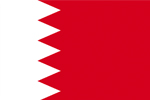
Population
1M+
CHRISTIAN PERSECUTION STATUS
minimal
Freedom
CHRISTIAN POPULATION
9%
Status of
the church
Bahrain has a large migrant population – only 45% of residents are citizens. It is more religiously diverse than other Gulf states; Muslims make up 70% of the total population, and 14.5% of all residents are Christian. The country is also home to Hindus, Buddhists, Sikhs, Baha’is, and Jews. Religious affiliation is associated with identity. Any Muslims who wish to change their religion face societal pressure not to do so.
Most people in Bahrain have access to higher education, and over 95% of the population is literate (CIA World Factbook). Almost 50% are immigrants, creating a diverse culture and a disparity in jobs and wealth. Unemployment in the nation is 15% (World Culture Encyclopedia).
Satellite television is commonplace, with 98% of people being Internet users (CIA World Factbook).
Location
Prayer points
What our viewers are saying